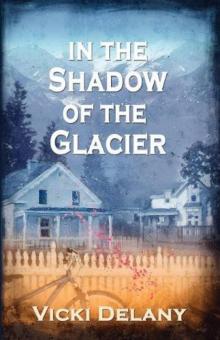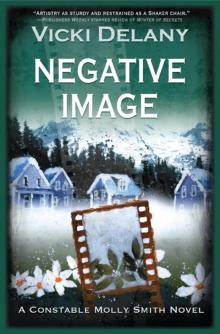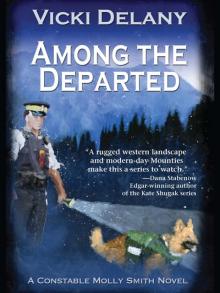- Home
- Vicki Delany
Whiteout
Whiteout Read online
Whiteout
Vicki Delany
This is a work of fiction. Names, characters, places and incidents are either the product of the author’s imagination or are used fictitiously, and any resemblance to any person or persons, living or dead, events, or locales is entirely coincidental.
Whiteout
ISBN 1-55316-084-3
Published by LTDBooks
www.ltdbooks.com
Copyright (c) 2002 Vicki Delany
Cover Art copyright (c) 2002 Patricia Storms
Published in Canada by LTDBooks, 200 North Service Road West, Unit 1, Suite 301, Oakville, ON L6M 2Y1
All rights reserved. The use of any part of this publication reproduced, transmitted in any form or by any means, electronic, mechanical, photocopying, recording, or otherwise, without the prior written consent of the publisher is an infringement of the copyright law.
Printed in Canada.
National Library of Canada Cataloguing in Publication Data
Delany, Vicki, 1951—
Whiteout
Also published in trade paperback.
ISBN 1-55316-084-3 (electronic)ISBN 1-55316-918-2 (REB 1100&1200)
I. Title.
PS8557.E4229W45 2002C813’.6C2002-900993-6
PR9199.4.D455W45 2002
Prologue
Footsteps were following her. She was sure of it. Every nerve twitched as she stopped walking and strained to listen. Nothing. She laughed at herself, a quick embarrassed laugh. Must be my imagination; imagine me being frightened like some kind of snotty-nosed little kid.
An ancient gray owl watched the girl’s progress with contempt. It wasn’t the owl that the human heard; the owl made sure to be sensed only when she wanted to be. No creature of that size was of the slightest interest to her. Her only concern at the human’s passing was that the girl might disturb the mouse now sniffing the air with great hesitation prior to stepping away from safety. The mouse was expending an extraordinary amount of effort checking the environs outside of its hole beneath the enormous old white pine, afraid to venture out to begin the night’s foraging, afraid to face the clearing and what might be found in it. At last the mouse looked as if he was set to make a leap into the darkness. The owl tensed, ready to launch herself off her perch.
The sound of the girl’s heavy boots stomping through the decay of the forest floor cracked the mouse’s courage and he dove back into his hole. The owl stared at the girl malevolently, then resumed her silent watch of the forest.
The girl heard nothing but the distant sounds of the party continuing on without her. Stupid party anyway, she thought in a vain attempt to cover up the hurt at being forgotten so quickly. At the thought that her so-called friends barely even noticed her distress as she slipped out of the circle of firelight to be swallowed up by the darkness of the deep woods.
She continued walking, whistling to herself. She was smart enough to know that the whistle was a futile attempt at reassurance, but she was powerless to stop it.
Then she heard it again: a dead twig cracking under a boot. She whirled around and shouted out in her loudest, most authoritative voice.
“Who’s there? Are you trying to scare me? Come out where I can see you.” To her horror her voice came out as a broken squeak.
“Hey, hold up there.” A teenaged boy, older than her, perhaps seventeen or eighteen, stepped into the path. He was dressed in a Tommy Hilfiger jacket and excessively baggy jeans. Above the waistline of the pants she could see the rim of dirty underwear. The jacket was probably stolen. This boy could never afford something like that. He held his hands out in front of him, palms up; a gesture of peace, and stepped forward.
High above them the owl shook her head in disgust; there would be no hunting at this spot tonight. She glided on silent wings into the depths of the forest.
“Why’d you run off so quick like that?” he said. “I wasn’t about to do nothing.” He stepped closer.
The smell of too much beer and unwashed clothes almost made her gag. She took a step backward. “I didn’t run off, I just want to go home. That party was boring.”
“Yeah, you’re right, it’s a real bore. How about you and me make a party of our own, eh?”
The girl took another step backward. “No thanks.” Despite her growing fear, she still tried to be polite, like her grandma had taught her. “I’m tired, I’m going home. See you later.”
As she turned to leave, the boy reached out and grabbed her arm. Now she could really smell the thick reek of beer on his breath. Beer and something else, something threatening and sinister.
“I thought you and me could party a bit more, how about it? A hot chick from Toronto like you ought to know some good party games.”
She tried to pull her arm away but his grip was too strong. “Let me go.”
“You a cock-teaser, or something?” He leered into her face, beer fumes and bad hygiene enveloping her in a wave of nausea. “You think that you can lead me on and not follow up. Is that it?”
“Look,” she pleaded. “I didn’t mean to lead you on. I’m sorry if you thought so. I just want to go home. Please let me go.”
“I’ll let you go home to Mama all right, but I’ll fuck you first, cock-teasing bitch.” He released his grip on her arm and with both hands lashed out and shoved her to the ground. She landed on a soft bed of pine needles, but it was sprinkled with tiny sharp twigs that dug into her back. The shock of the landing shot up her spine and dazed her momentarily. She shook her head to clear it.
The boy loomed over her. Unaccustomed to power, his eyes swelled to monstrous proportions. He breathed deeply and rapidly through his mouth.
The fall shook the girl to her bones; she lay stunned on the forest floor. Too stunned to hear a soft, gentle moan breaking through the silence in the clearing. But the boy heard it, deep in his soul. It was his turn to be scared. The darkness surrounding the girl and boy shifted and moved. Black is black, but this black moved. It was darker than the blackness of the woods at night. The moan sounded again, a long, mournful vibration, a sound without meaning and a sound without hope. The blackness moved again. It drifted gently over the girl where she lay on the ground. The blackness stopped in front of the boy. The look of power had died in his eyes, it was gone and it would never return. He turned and ran.
The girl stumbled to her feet and ran as fast as she could toward home.
Chapter 1
Gray water and gray sky blended seamlessly together in the mist. There was no horizon, only a world of gray, unmarked by beginning or ending. Like my life, Joanna thought.
It had stopped raining but the air still hung thick and heavy with moisture. There was no wind; the water on the lake lay quiet and still. In the woods behind her the trees shook off a steady stream of rainwater.
Joanna stood on shore beside the dismantled dock and stared across the lake for a long time. The mist muffled any noises from lake or forest; serenity enveloped her like a soft wool cape. The haunting call of a loon broke through the silence and echoed across the lake, long and lonely and piercing.
She nodded to herself and smiled. As omens go, that one is fitting. Life always goes on, after all. She turned her back to the lake and walked up the hill toward the cabin. She hesitated before putting the key into the lock, took a deep breath, unlocked the door and stepped into her new life.
“Well, hello, world. Here I am.” Joanna announced her arrival in a loud firm voice to the empty room. “First things first, then I’ll stop to think.” Bone chilling damp filled the cabin. It was only late September, but this far north in Ontario, September often meant wet, cool days and frosty nights. Fortunately a supply of firewood was chopped and neatly stacked beside the old iron stove, waiting for her arrival, a box of long matches lyi
ng nearby. Although Joanna had no experience lighting a wood-burning stove, the instructions she had received over the phone were excellent and a strong fire was soon burning cheerfully.
She returned to her car and set about carrying boxes and bags into the cabin. She hadn’t brought much from her old life to the new. It was surprising how little one really needed. A lifetime of accumulation reduced to no more than it takes to fill the trunk of a Toyota.
The cabin came fully furnished, she had put most of her belongings into storage not knowing or caring if she would ever have use for them again. She brought little with her other than her clothes, a few favorite cooking pots, some good sheets and towels and her best prints. Plus, of course, her library of books and the computer, which were the tools of her trade, and her CD player.
From the first box she carefully extracted three picture frames and placed them on the tiny table by the large front window, where she planned to set up the computer. She held each picture in her hand for a moment before setting it into place. Wendy posed solemnly in gown and mortarboard at her University graduation, trying so hard to be serious while inwardly shouting at the camera, “Look out world, here I come.” James was laughing; sometimes it seemed as if James was always laughing, waving to her from the canoe he loved more than anything, that last summer in Algonquin Park. Alexis had been caught in a rare moment of peace, setting out for school on a warm spring day, clad in her regular uniform of dirty jeans, black T-shirt and overlarge flannel top; frozen in time as if all would be well once again. Tears filled her eyes and Joanna put the last picture down with a soft thud.
She walked around the main room, deciding where it would be best to put her things. She would drag the kitchen table over here to make the space her dining room as well as her office, for the window overlooked the forest of maples and pines and on down to the lake. At least she would have a panorama of the lake from here. It was dark now, only the first row of trees were visible in the light cast from the cabin windows, standing like ghostly sentinels against the nightly spirits of the Northern woods. As she wandered around her little cabin, imagining how it would be all fixed up, she could feel the pall of anxiety lifting off her shoulders like a Victorian bride carefully removing her veil for that first, hesitant kiss. She had been crushed by despair, by depression and by responsibility for too many years. She believed she could now cast them off, like the bridal veil on the wedding night, and go on.
She finished unpacking, opened a bottle of Cabernet Sauvignon she had brought from the city and sipped it while preparing her dinner. An excellent bottle, far more than she would normally spend, or could afford, but she so wanted to mark this first night as something special. On the CD player Loreena McKennitt sang the haunting strains of “Greensleeves.” She chopped onions and peppers and several cloves of garlic, put chicken into the oven to broil and a cup of basmati rice on to boil. While the chicken cooked she chopped more vegetables and ripped up red-leafed lettuce for a salad.
The shrill ringing of the phone cut into the quiet of the little cabin like the alien presence it was. Instinctively Joanna put down her knife and crossed the room. The phone was a heavy black rotary dial, one the likes of which she hadn’t seen for many long years.
I don’t have to do this, she thought, putting the receiver to her ear. If I don’t want to answer the damn phone I don’t have to. Not anymore.
“Hello.”
“Mom, how are you? Are you okay? Have you gotten settled in? What’s the place like?”
“Oh, Wendy,” Joanna replied. “I’m fine. I’m cooking dinner now. The cabin is exactly as I thought it would be: small, plain and simple. I’ll be fine.” Fortunately the phone had an exceptionally long cord. She stretched it across the tiny room into the kitchen and stirred her vegetables with the phone propped on one shoulder.
“Now, are you really sure this is what you want? You can always change your mind and go home.”
“Please, Wendy, we’ve been through all this. This is what I have decided to do. And you know full well that I can’t come home and I can’t back out of this deal on the cabin.”
“Robert and I have been talking about it,” Wendy said.
I’m sure you have.
“And we think that you should come and stay here with us. At least until you find a place to rent in Toronto. You know how thoughtful Robert is. It would work out fine.”
Wouldn’t that be bliss, thought Joanna, all three of us living in a little graduate student hovel in Toronto. The ever-noble Robert wouldn’t last a week.
“No dear, I don’t think so. Now I have to go, dinner is almost ready.”
“I’ll call you tomorrow to see if you’re okay.”
“No. No you won’t. I don’t want you checking up on me, Wendy.”
“I really don’t think its safe, Mother,” Wendy insisted. “I’ve said all along, it’s not safe, you living up there all by yourself. Suppose something happens to you. Suppose you have an accident and break your leg or something and can’t get to the phone. You could lie out there for days and no one would know a thing about it.”
Joanna rolled her eyes. “Maybe you shouldn’t be living in downtown Toronto, Wendy, it’s not safe. Suppose you are mugged one night walking home from class. Suppose some crazed drug addict breaks in when Robert isn’t home and you’re there by yourself.”
“That’s different.”
It’s always different for children. “I don’t have an answering machine here yet and I don’t have voice mail, so don’t be rushing up with the police if I don’t answer the phone every time you call, do you hear me?”
“Yes, Mother. I hear you.”
“Good night, dear.”
“Good night.”
Joanna shook her head as she hung up the phone. As annoying as that conversation was, it was nice to know that someone did care about her.
She placed a single tall silver candlestick on her table and lit the candle. A bunch of fresh flowers bought on a whim as she drove out of the old neighborhood was arranged in a drinking glass to serve as a centerpiece. She turned off most of the lights, poured herself another glass of the excellent wine and served up a huge portion of chicken and rice. The trees outside the cabin windows were barely visible, swaying gently in the shadows. The mist had cleared and a full moon was rising over the lake, casting a stream of light to dance gaily across the dark water up to her dock. All was still and quiet. For the first time in many long years she felt serenity settle around her. Loreena McKennitt sang on and she started to eat.
Joanna awoke with a start, and for a moment she couldn’t remember where she was. The fire in the wood stove had gone out and her bedroom was freezing. She pulled the quilts tighter under her chin and tried to settle back to sleep. She couldn’t stop shivering and was soon driven to throw off the covers and pull on housecoat and slippers. Might as well get used to country living right away.
She padded into the living room and started the stove with logs and kindling chopped and waiting on the floor. Perhaps I should chop some more firewood, she thought. This pile won’t last much longer. Not that Joanna knew anything at all about chopping wood, but how difficult could it be?
After lighting the fire she ground coffee beans and put them on to brew, then walked across the room to stand at the long window. A weak autumn sun was beginning its slow rise behind the cabin; the trees cast long shadows over the lake. Not a cloud marred the soft blue sky. She wrapped her arms around herself and snuggled further into her robe. She shivered once again, but this time it took a moment until she recognized the feeling. Not cold but joy, and joy had been a rare thing in her life for a long time. It felt good.
The rich, welcome aroma of coffee filled the small cabin. It smelled wonderful, and even more wonderful was the simple fact that she had nothing in particular to do today. Once the machine ceased bubbling and the coffee was ready, Joanna poured herself a large mug and took it out to the deck. With the worn terry cloth belt of her housecoat she wiped a
dry place to sit on the single bench. “Deck,” she realized, was altogether too fancy a word for something that was no more than an old wooden porch on spindly legs.
The cabin had come cheap, the most that Joanna could afford. Once she had made up her mind to give up her job and leave the city everything happened almost at the speed of light. Her house rented so soon after she advertised that she was caught breathless by the sudden direction her life was taking. She did not bother to inspect the cabin before renting it, just asked a few questions over the phone and signed the papers that arrived in the mail. Although she had not been expecting much, in the daylight she could plainly see that she had received nothing more than she had paid for.
The ad for the place called it a “cottage,” but it had none of the country home elegance that word implied. This was a cabin in the woods, plain and simple. It consisted mostly of one room, with a small room off the back to be used as the bedroom and a tiny, ancient bathroom. The kitchen was an alcove, open to the rest of the cabin. A wooden porch ran the full length across the front, affording a fabulous view of the lake and surrounding woods. As much as it was in need of a thorough sanding and a good coat of varnish, the long, wide porch stretching the full length of the cabin was certainly the best feature of the place. There was no garden, just a clearing in the woods with the little cabin sitting in the center of it, and a rough gravel driveway running down the hill from the road. A small, largely overgrown path etched through the woods led down the hill to the water. The dock had been taken apart and stacked on the rocky shore for the winter, safe from the destructive power of packing ice. There was no garage or other shelter for her car. Joanna hoped that wouldn’t be a problem. She had no intention of going anywhere with any great urgency. She was rather looking forward to being snowed in, with all the solitude and isolation that phrase suggested.

 Silent Night, Deadly Night
Silent Night, Deadly Night Coral Reef Views
Coral Reef Views Deadly Summer Nights
Deadly Summer Nights Murder in a Teacup
Murder in a Teacup Whiteout
Whiteout Dying in a Winter Wonderland
Dying in a Winter Wonderland Tea & Treachery
Tea & Treachery Rest Ye Murdered Gentlemen
Rest Ye Murdered Gentlemen Body on Baker Street: A Sherlock Holmes Bookshop Mystery
Body on Baker Street: A Sherlock Holmes Bookshop Mystery Body on Baker Street
Body on Baker Street Gold Mountain
Gold Mountain Blue Water Hues
Blue Water Hues Hark the Herald Angels Slay
Hark the Herald Angels Slay Murder at Lost Dog Lake
Murder at Lost Dog Lake Blood and Belonging
Blood and Belonging A Winter Kill
A Winter Kill White Sand Blues
White Sand Blues Scare the Light Away
Scare the Light Away Burden of Memory
Burden of Memory More Than Sorrow
More Than Sorrow In the Shadow of the Glacier
In the Shadow of the Glacier Gold Digger: A Klondike Mystery
Gold Digger: A Klondike Mystery Gold Web
Gold Web Haitian Graves
Haitian Graves Valley of the Lost
Valley of the Lost We Wish You a Murderous Christmas
We Wish You a Murderous Christmas Negative Image
Negative Image A Scandal in Scarlet
A Scandal in Scarlet Juba Good
Juba Good Winter of Secrets
Winter of Secrets Unreasonable Doubt
Unreasonable Doubt Gold Fever
Gold Fever Among the Departed
Among the Departed Elementary, She Read: A Sherlock Holmes Bookshop Mystery
Elementary, She Read: A Sherlock Holmes Bookshop Mystery The Cat of the Baskervilles
The Cat of the Baskervilles